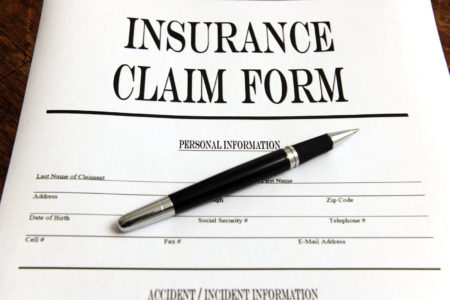No one wants to file an auto insurance claim. It means you’ve been involved in some kind of accident. Unfortunately, it often translates to thousands in costs for drivers, even when they weren’t at fault. You have to pay your deductible and anything your insurance doesn’t cover.
When you file a claim, it means that you’ve had a loss that has resulted in either property damage or bodily injury. Since accidents and other losses can lead to a whole lot of stress, your mission in life as a licensed driver is to avoid filing a claim at all costs.
Not only can auto insurance claims be stressful to manage, they can also affect your auto insurance standing after the claim has been investigated. Some companies will maintain your insurance rate after a qualifying accident with accident forgiveness. If you decide to switch insurers, the accident forgiveness will not follow you.
Enter your zip code above to compare multiple car insurance quotes at once!
Some chargeable claims can increase your insurance rates and other times claims can lead to the termination of your policy. If you’re debating whether or not you should file your claim, here’s what you need to know about claims and how they can affect the status of your policy:
What is an auto insurance claim?

An auto insurance claim is a formal request made to your auto insurance carrier to ask that you receive a payment for a loss under the terms of the policy.
You can either file a first-party claim against your own insurance policy for damages to your vehicle or your own medical bills, or you can file a third-party claim against the other party’s policy when you’re not at fault for the loss.
Compare quotes from the top car insurance companies and save
Secured with SHA-256 Encryption
When do you file a claim against your own auto insurance policy?
When you get into an accident or you discover that your vehicle has been damaged and is in need of repair, the first thing that you need to do is call your own company’s claims departments. They will assign an adjuster to evaluate the damage and investigate your claim.
When you call the department, you’ll inform them of the incident and give them as many details as you have for the claim to be investigated.
If you’re filing a claim against your own coverage, it will be classified as a first-party claim. This usually happens when you’re at-fault for the accident and you’re filing a claim for physical damage. It can also happen when you’re not-at-fault or you’re in an accident with an uninsured motorist.
Some of the coverage options you can file against include:
- Comprehensive – when your car is damaged by a fire, theft, vandalism, flood, or other non-moving loss
- Collision – when you’re in an accident that you’re at-fault for or when the other driver can’t be identified
- Medical Payments – when you’re injured in any type of accident involving a vehicle
- Uninsured Motorist Protection – when you’re in an accident with an uninsured driver and you’re injured
- Uninsured Motorist Property Damage – when you’re in an accident with an uninsured driver and your car is damaged
- Rental Car – when your car is damaged in a loss and you need a rental car as a temporary replacement
- Towing – when you need a tow because your vehicle is disabled
When do you file a claim against another party’s insurance?
There are other scenarios where you’ll file a claim against the other party’s insurance.
This happens when another party is at least 51 percent or more at fault for the loss. When you’re not at fault for the accident, you’ll still need to call your own insurance company for your own protection.
But third-party coverages will do the bulk of the heavy lifting.
- Bodily Injury Liability – when you’re injured by the driver in a not-at-fault accident
- Property Damage Liability – when your car is damaged by the other party in an accident
Can an insurance company cancel your insurance after you file a claim?
Filing a claim isn’t going to automatically disqualify you from keeping your insurance. As long as you do not commit fraud, pay your premiums on time, etc., your policy will be good until it expires. (For more information, read our “Can your car insurance company cancel your policy?“).
Don’t ever avoid filing a claim that you need to file because you’re worried about your insurer terminating your contract.
Your carrier must comply with the rules in the Consumer Bill of Rights when the carrier is canceling your coverage. Especially if you’re with a smaller insurer, they may op not to renew. They have to notify you based on state law and policy terms. So you’ll have time to find replacement coverage.
Compare quotes from the top car insurance companies and save Secured with SHA-256 Encryption
Compare quotes from the top car insurance companies and save
Secured with SHA-256 Encryption
When is an auto insurance company allowed to cancel your coverage midterm?
As long as you comply with the terms and conditions of your auto policy, the company can’t end your coverage until the term expires and it’s time for the coverage to be renewed.
There are still a few instances where the company is entitled to terminate the contract during the policy period. Here are some of those instances:
- You fail to make your premium payments on-time
- You lied on your insurance application
- You have filed a fraudulent claim
- You have violated terms and conditions on the policy
- You filed a fraudulent claim
When will the claim that you filed affect your insurance?
Claims take time to investigate. The insurance company will assign a professional adjuster to your file to determine who’s at fault for the loss.
After the insurance claim has been fully investigated, the fault has been declared, and the settlement offer has been accepted, the claim can be closed. An open claim can’t affect your rates or your policy. (For more information, read our “How long can my car insurance claim stay open?“).
Not only does the claim has to be settled for it to affect your insurance, it also has to be closed by the policy’s next renewal. If you filed your claim right at the beginning of your term and it’s settled just a few weeks later, your rates won’t go up immediately. (For more information, read our “Can my car insurance go up for no reason?“).
It’s not until after the claim is closed and the policy is set to renew that you’ll see the insurance carrier take the appropriate action.
What will happen at your next renewal?

Your policy renews for a very important reason. When you choose a term, you’re at ease in knowing that you’ll have guaranteed coverage for six months or a year.
Renewal is a process that gives the company the right to reassess your application and decide if the company wants to continue doing business with you.
Most companies will start the process of renewing your insurance about 45 days before your policy period ends. This is why the underwriter will look at your driving record, your accident history, and other factors that can affect your risk class.
If you have an at-fault claim on your record, it can affect your relationship with the company.
Compare quotes from the top car insurance companies and save
Secured with SHA-256 Encryption
When will the company drop you as a client because of a claim?
When a carrier decides to end a relationship with a policyholder it is referred to dropping a policy. State officials will also call this a non-renewal.
After you file a claim, your policy isn’t automatically non-renewed but it is a possibility. It all depends on your record at the time of the loss and other details on your insurance. Here are some reasons a carrier might drop your policy after a claim:
- You have multiple at-fault accidents and no longer qualify for coverage
- You have a combination of no-fault and at-fault accidents that no longer qualify you for coverage
- You’re a high-risk driver and the claim has made you ineligible for coverage
- A household driver who wasn’t listed on the policy had a claim
You buy insurance and pay regular premium payments so that you have protection if you need to file a claim.
It’s not always a bad thing to file a claim against your coverage. If you’re not happy with how your company handled the claim, get instant quotes online and decide if you want to switch carriers.
Enter your zip code below to find car insurance rates that fit your budget!